Life in the Netherlands: The Best Traditional Dutch Food Recipes
The Best Traditional Dutch Foods and How to Make Them
Let's be honest about Dutch food. It doesn't exactly have a world-leading reputation. Dutch cuisine is not on the same level as French, Italian, Japanese, or Thai, among many others, and the Dutch are not known for their culinary excellence or elegance.
It's also hard to actually say what typical Dutch food really is. I mean, when it comes to traditional Dutch food you may find yourself scratching your head after you've named cheese and pancakes (which aren't exactly exclusively Dutch food specialties anyway), and they're not exactly substantial meals (although I know several people would challenge me on that!).
So I decided to write this post sharing some truly delicious dutch food recipes in order to give you a yummy overview of how there are many traditional Dutch foods that you may or may not already know, and how many of them are worth seeking out during travel to Amsterdam or the Netherlands, or even while you're still at home.
If you're worrying that me, an amateur chef (at best!) is about to give you all my own recipes for these traditional Dutch foods, you can be reassured that I am not.
While I'm a decent enough cook and only marginally better baker, I have not yet turned my hand to cooking many typical Dutch foods. Mostly, this is because I can enjoy the real deal here in Amsterdam, but also because I am quite intimidated by the idea of cooking dishes that I didn't really grow up with - does that sound strange? Maybe, because that hasn't stopped me trying out Thai, Mexican or Vietnamese foods but I think it's because I feel less pressure with those dishes. Whereas with traditional Dutch foods, I live in the country they come from so I feel like I should maybe know more about them or how to cook them and so I get intimidated from the outset and dono't even try...
In some ways I'm hoping that in posting this round-up of some really delicious and varied Dutch recipes by much more accomplished cooks (from all over the world, not just Dutchies!) I will feel more motivated to give some of them ago. I've tried to include a good balance of savoury and sweet traditional Dutch recipes, and have found a number of vegetarian or vegan alternatives for most of the dishes so everyone can try a good range of Dutch dishes.
You will also find many of the recipe creators themselves offering vegan, vegetarian, gluten-free and other allergy-compliant alternatives in the ingredients lists so please do take some time to check the recipes out to see what you can do to sub ingredients if you need to. If you're vegan or vegetarian and heading to Amsterdam soon, please do check out my vegan guide to Amsterdam here.
FURTHER READING & DISCLOSURE: Bring more of Amsterdam into your home with this guide to virtual tours and travel in Amsterdam, or enjoy a good book set in or about Amsterdam from this reading list. And before you read more, please note that this post includes affiliate links.
Savoury Traditional Dutch Food Recipes
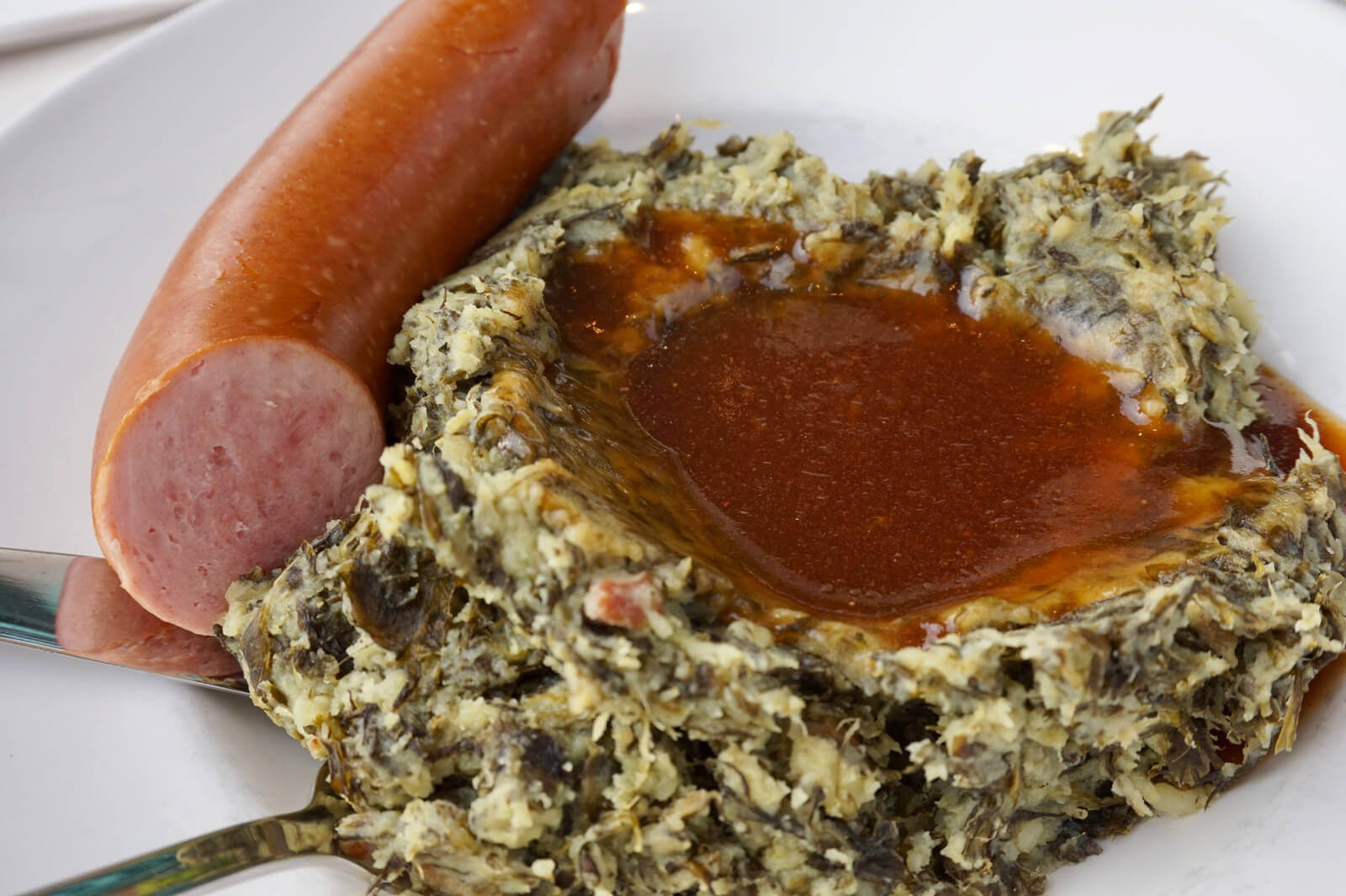
When I think about typical savoury Dutch food I think of warm, stodgy, hearty meals. When autumn and winter roll around, I just love living in the Netherlands because the food makes me feel full and warm. (And PS Amsterdam is pretty beautiful in both autumn and winter!)
Of course, this is not to everyone's taste, and when I joked to an Italian friend about quite enjoying Dutch food, he laughed and said he wasn't surprised because I'm British and our cuisine isn't that dissimilar. He may have a small point, but please don't knock Dutch food (or British!) until you've tried it.
And these really are the best traditional Dutch dishes you need to try in the Netherlands, or in the comfort of your own home. Because, yes, below you will find links to recipes for each dish, and we're going to start with the best savoury Dutch food you need to know about.
Stamppot (Mashed Potatoes & Vegetables, Sausage & Gravy)
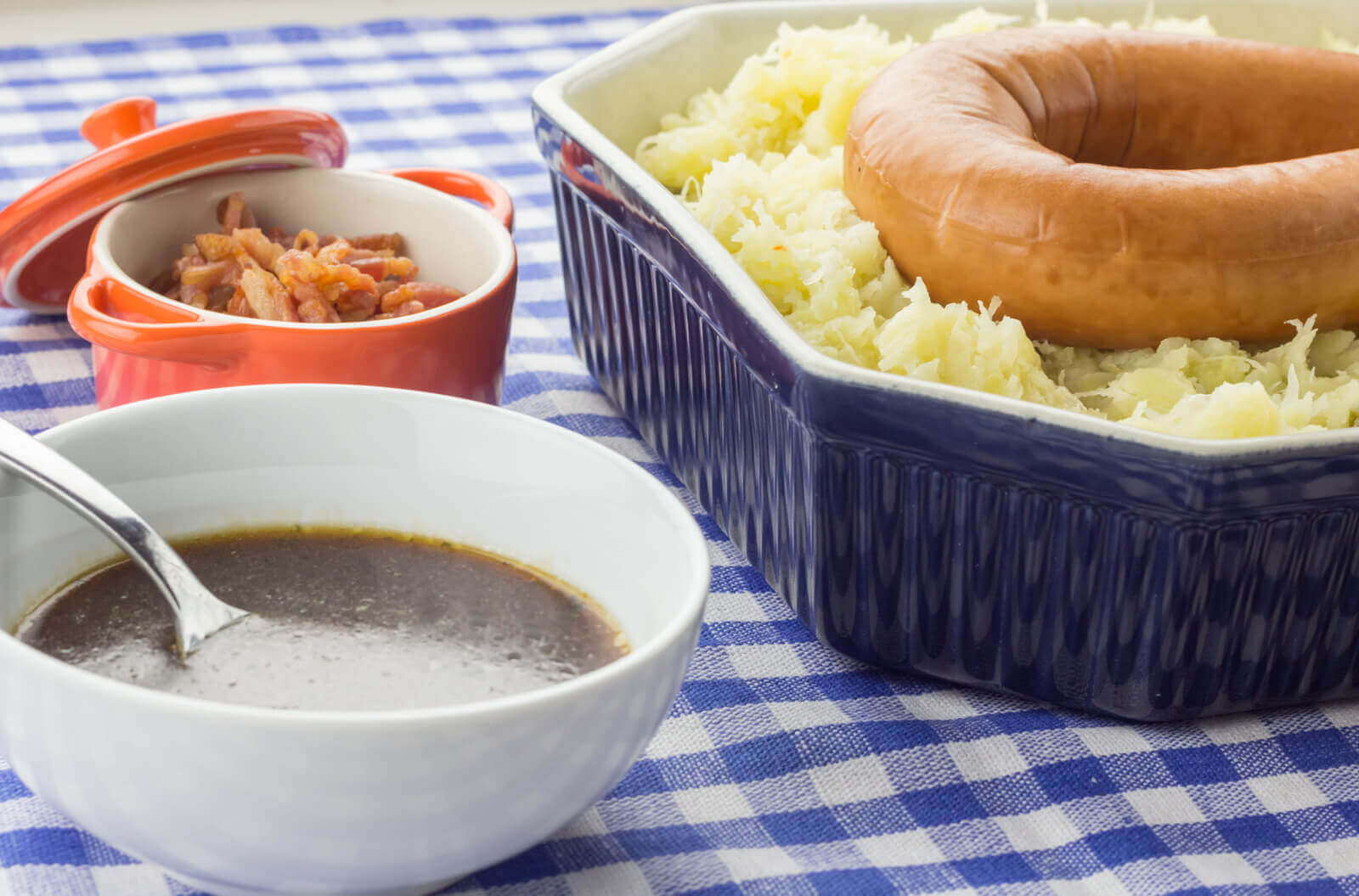
What is essentially mashed potatoes and vegetables with sausage, bacon bits and gravy, stamppot actually has more surprising variations than you can imagine, and can absolutely be made to be vegetarian or vegan-friendly. The best stamppot in Amsterdam can be enjoyed at Moeders restaurant (a place that needs to be seen to be believed) but I'll humbly say I can make a pretty decent one too... as do most of the supermarkets in the Netherlands too for those days when you don't have time or the energy to mash, mash, mash or stamp, stamp, stamp!
Here's a round-up of more than 40 different stamppot recipes and photos on Pinterest, here are five vegetarian versions (in Dutch but Google Translate works fine), and here is a vegan recipe for stamppot.
Hutspot ("Hotchpotch")
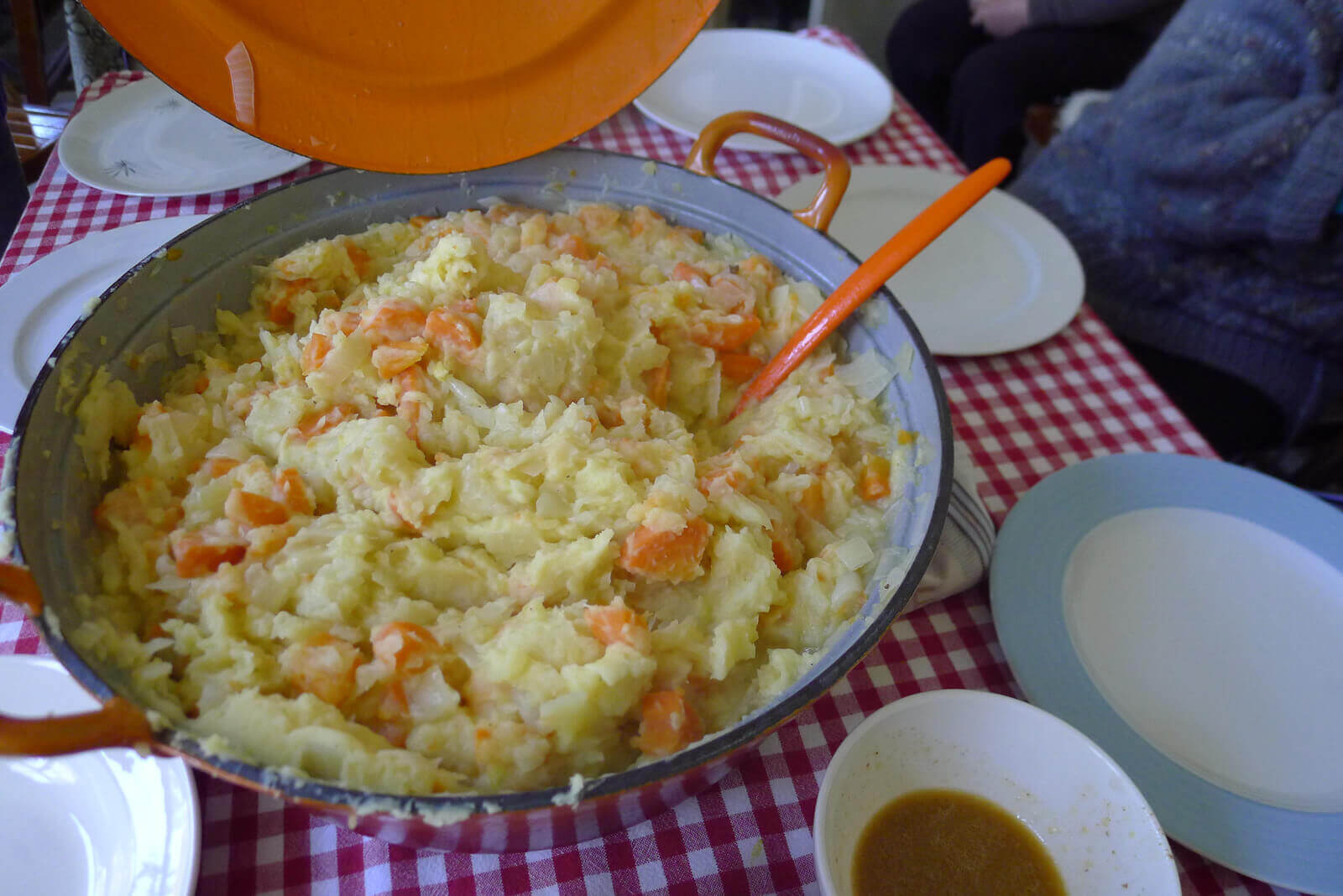
A not so distant cousin for stamppot, hutspot is a Dutch word and dish that can be translated to English as "hotchpotch", which in my mind is exactly what the dish is - mashed potatoes, onions and carrots, and/or other vegetables. I suspect it's more of a fairly world-renowned Dutch dish than I first thought, because even Food.com have their own recipe for it.
Erwtensoep (Dutch Pea Soup)
One of my favourite Dutch dishes is this modest pea soup, or erwtensoep, which I find is just as hard to pronounce as it looks! Usually served with chunks of sausage in it (are you noticing a theme!), it's served as a main meal and therefore should be thick enough your spoon can stand up - my rule, not the Dutchies', although I'm pretty sure they would agree! This recipe and photo looks about right!
Nasi Goreng (Indonesian Rice Dish)
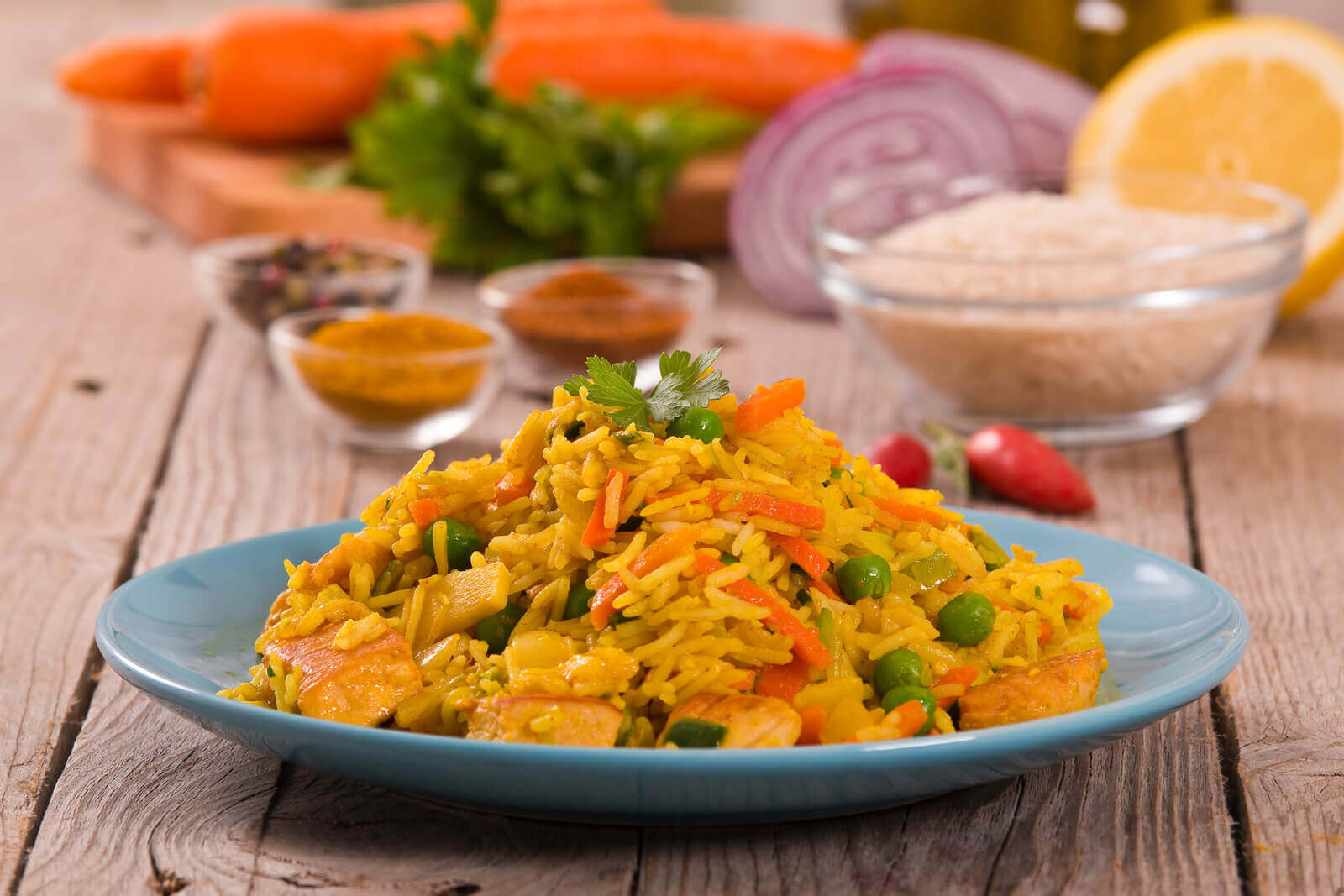
Just as the Brits' most popular meal is a curry, the Dutch are also very partial to Indonesian dishes such as chicken satay, the feast-tastic rijsttaffel (both listed immediately below) and also this, nasi goreng, a dish I'd never heard of before moving to Amsterdam but now hear a lot about. They even serve it regularly in my son's daycare!
Essentially, fried spiced rice, chicken and/or prawns, and vegetables, and sometimes served with a fried egg, the translation of nasi goreng is "fried rice" and this recipe makes it look easier than I thought, and the crucial Indonesian ingredients are all easily available in Dutch supermarkets. Yay! Here is also a great vegetarian version.
Kip Sate (Chicken Satay)
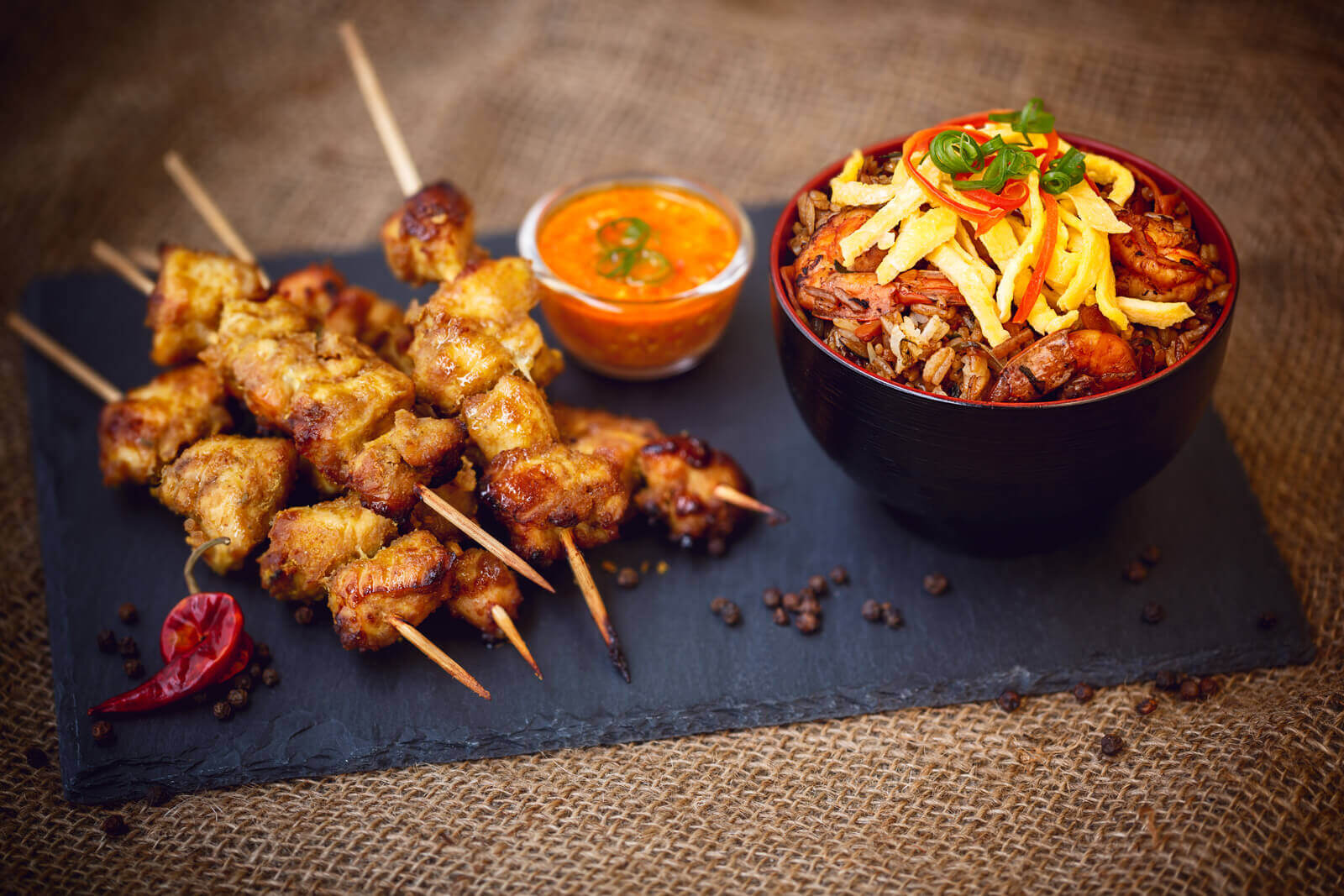
Staying with Indonesian foods the Dutch have heartily adopted, chicken satay is an essential part of most meat-eating Dutchies' diet. In fact, when a Dutch blogger friend of mine moved to London she sent me a message asking where in the supermarket she may find satay sauce. Indeed in any Dutch supermarket you'll see several rows of options, meanwhile in UK I suspect you'd have to make your own.
This recipe looks the most like what you can order in Dutch cafes and restaurants (it's typically a bar meal, but can be found in many restaurants) and there's also a vegetarian/vegan recipe for satay sauce in this post that you could use to marinade vegetables or a meat-substitute.
Rijsttaffel (Rice Table - Indonesian Buffet)
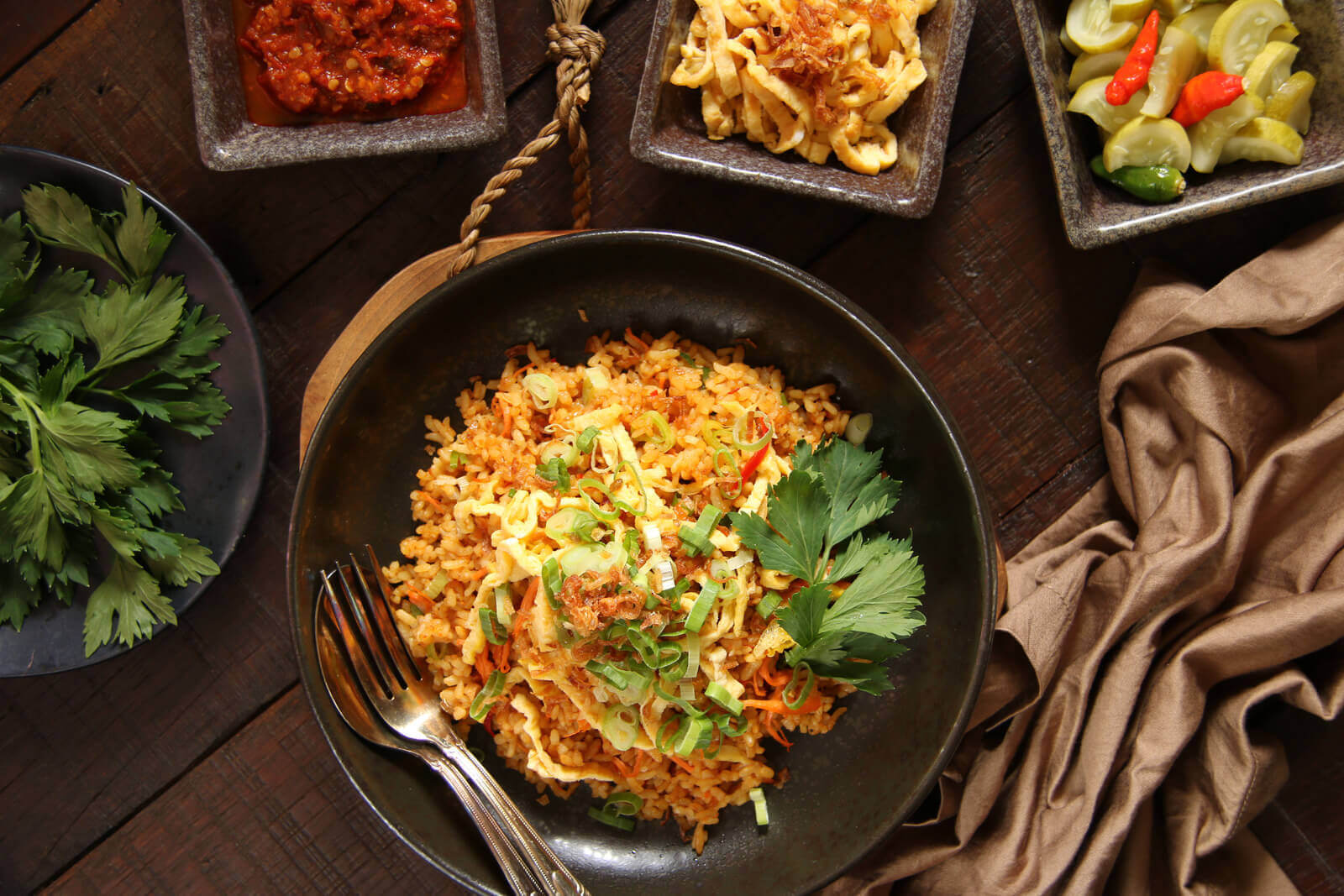
You can try nasi goreng, kip sate and a variety of other Indonesian dishes at a rijsttaffel which is certainly one of the most popular Dutch foods, or rather Dutch culinary events, because it's really not just one meal or food but a selection of many different dishes, eaten with rice. This post explains a bit more about what you eat and where the tradition came from.
Going for a rijsttaffel is definitely something I recommend people to do when visiting Amsterdam, but you can also attempt to re-create this at home too, although there really is no limit to the number of dishes you can add to your rijsttaffel so be prepared to cook A LOT. This post lists some of the most popular rice table dishes, and links to their recipes too. Some are vegan or vegetarian by default, but non-meat versions can also be found in Dutch restaurants and in online recipes too.
Bitterballen
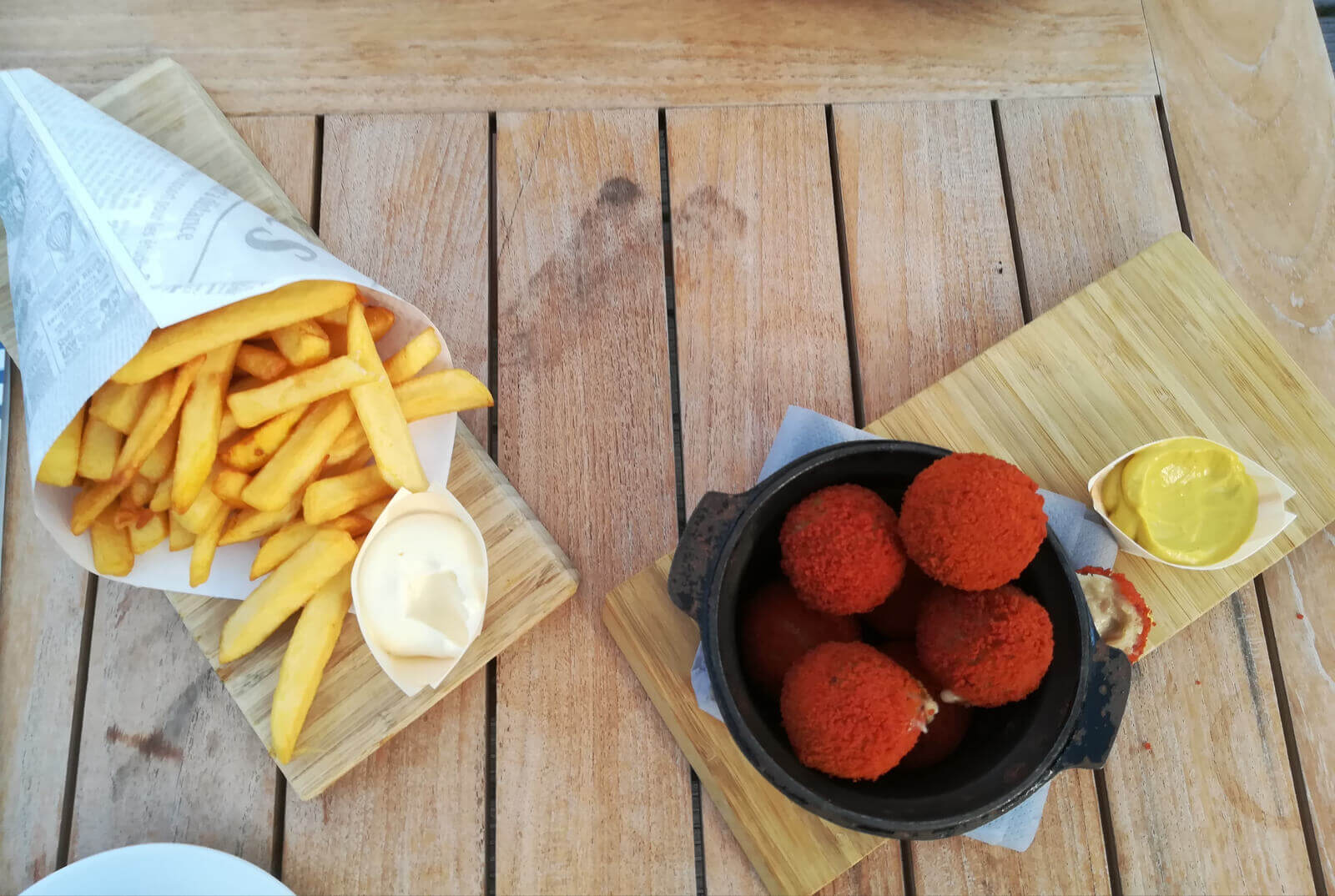
I often wonder if my Italian friend's comment was mostly formed when he was first served bitterballen, because healthy, fresh, rich in nutrients they are NOT! But yummy, heart-warming, stomach-filling, and often hotter than the sun, these bread-crumb-coated balls of deep-fried potato-beef-stew definitely are!
Most often served as a bar snack with a generous helping of mustard to dip them in (and once you do enjoy a biertje with a plate of these you'll never be able to drink Heineken or Amstel alone again), they can also be bought frozen in Dutch supermarkets. As they're deep-fried, they're not something I'll ever be adventurous enough to cook at home, but recipes for bitterballen do exist, even for vegan ones and gluten-free versions. Lekker!
And yes, bitterballen does translate as "bitter balls" and I'm not really sure why, but I appreciate the comic value of such a word so much I added it to my list of Dutch words that sound rude but really aren't.
Dutch Fries
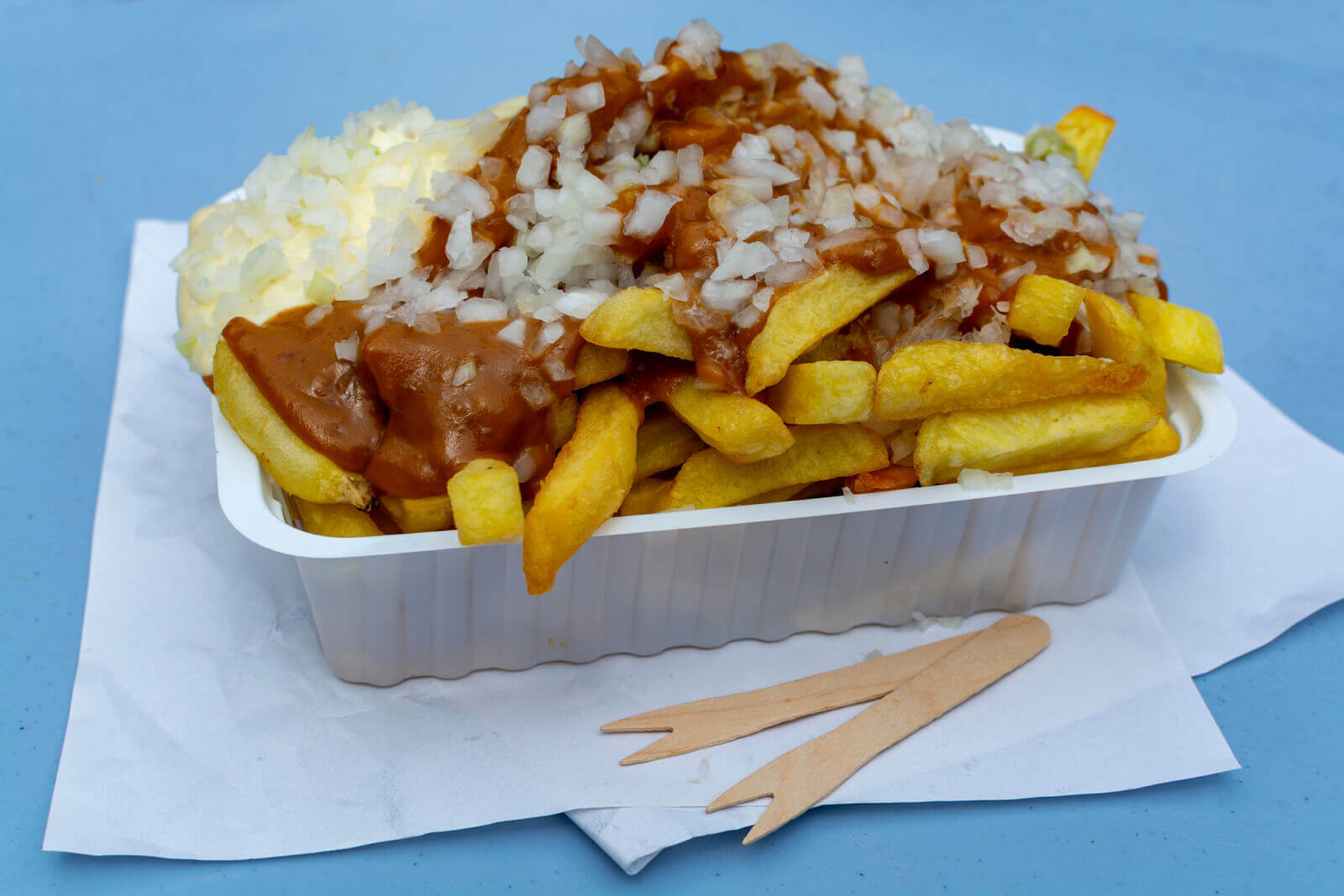
More fried food! Yay!
Well, actually let's pause and just acknowledge that many people (maybe from neighbouring Belgium!) will be quick to tell me that fries, chips, or pataatje as the Dutch call them, are not exactly a Dutch traditional food, but you try and tell that to all the tourists who come looking for it, or the chip shops and market stalls that happily sell it to them. Flemish and Dutch dishes are often very similar and the Dutch have definitely borrowed this specific dish for a LONG time.
Here's a recipe to make them at home and I definitely urge or challenge you to try or make oorlogsaus or sauce as a topping too. It translates as "war sauce" and it's a weird mix of peanut satay sauce and ketchup, typically topped with finely chopped white onion. I like to think it's called "war sauce" because it looks like such a bloody mess but I suspect there may be more to it.
Mosterdsoep (Dutch Mustard Soup)
And now we move onto another hearty, and very memorable Dutch soup, but not really one I love myself. Mustard Soup is commonly found in the Groningen area of the Netherlands and while it might sound strange, it will be a dish that some people love as one spoonful of gentle spicy tanginess will make them understand what all the fuss is about. Here's a recipe for you to make Mosterdsoep at home.
Tomatensoep met Balletjes (Tomato Soup and Mini Meatballs)
You see these mini soup meatballs in all Dutch supermarkets and while I buy them and cook pasta dishes with them, it does appear that they are traditionally eaten with soup. And one such soup is this yummy recipe for tomato soup, which also includes a recipe for the mini meatballs. It's definitely something I am going to try making soon as it does look easier - and more veg-filled - than I imagined.
Aardappel Kroketten (Croquettes)
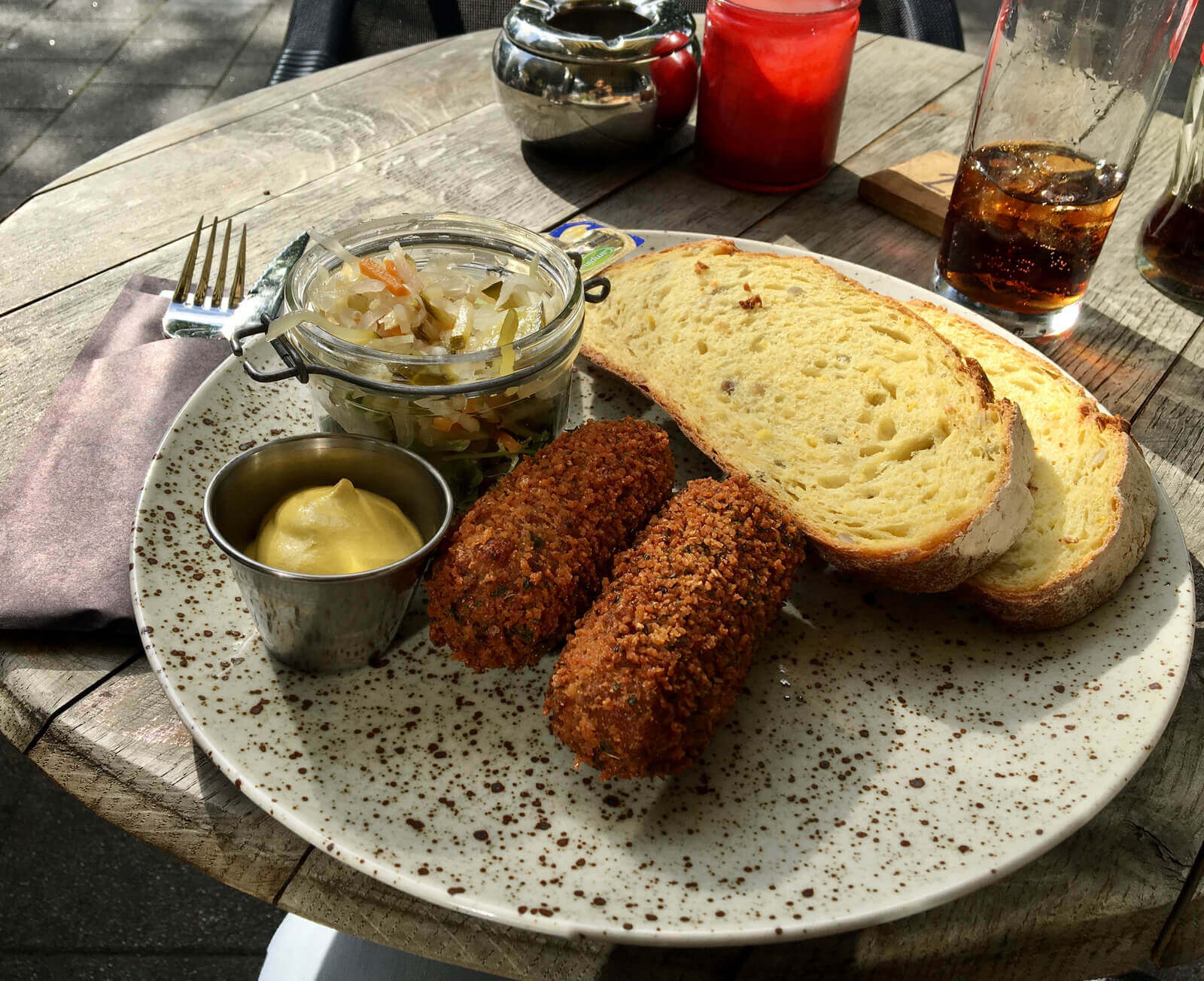
What is basically bitterballen but in different shapes, kroketten are one of the most popular street foods in the Netherlands and you'll most typically find them served with two plain (no butter!) pieces of bread for you to either assemble a sandwich or cut into the croquettes and spread over the bread.
There are many different fillings you can have from the typical bitterballen potato and beef versions, through to vegetarian versions like these simple potato ones with Gouda, the famous Dutch cheese. And here's a vegan version with a spinach filling.
Stoemp (Mashed Potato)
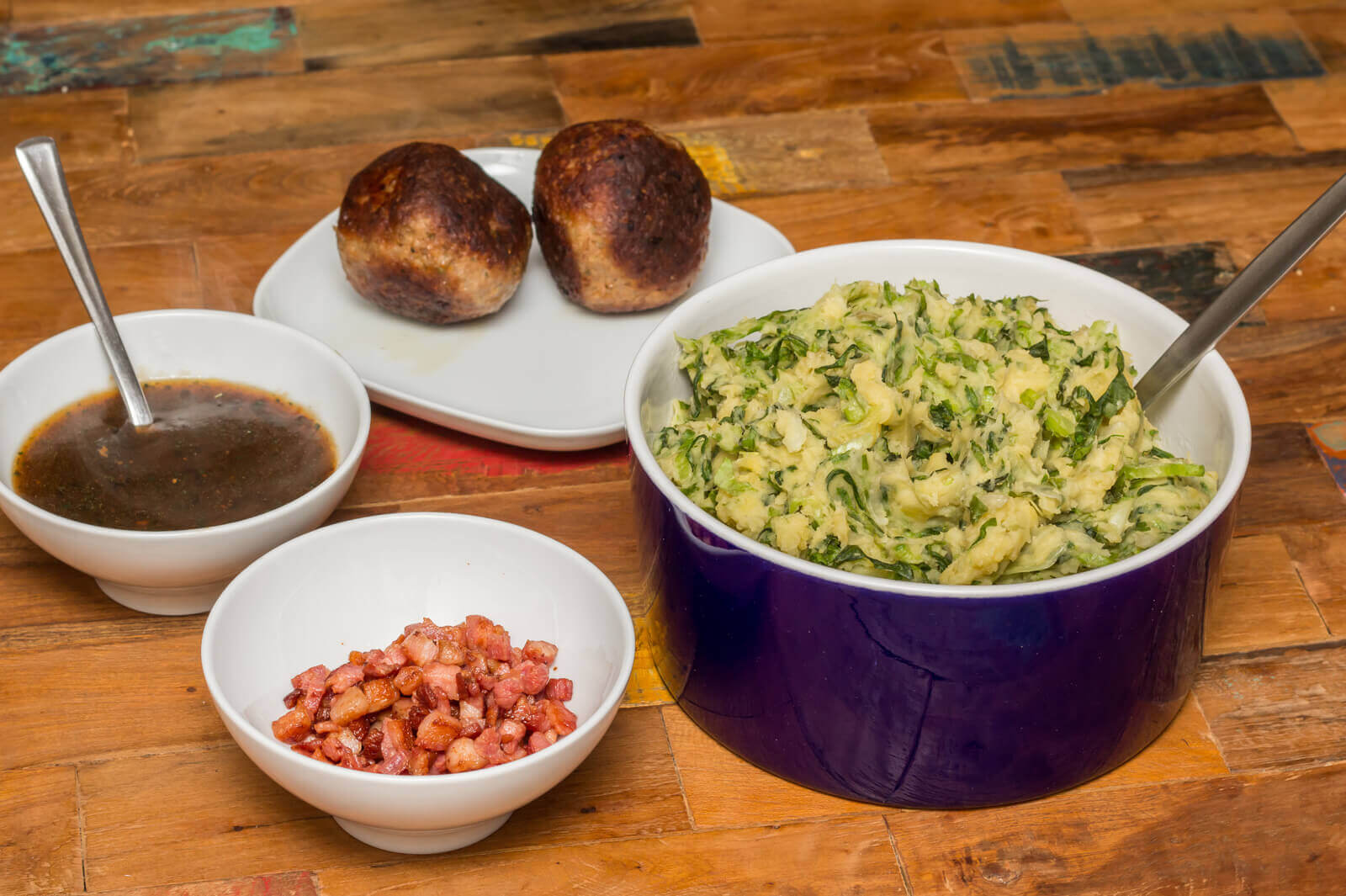
With a nod to the two dishes at the top of this list of savoury Dutch food, stoemp is a mashed potato dish that's popular in the Netherlands and Belgium. Diced vegetables are added to creamy mashed potatoes to add more flavor, color and an incredible texture.
Here's one such recipe for stoemp that is naturally vegetarian and gluten-free, and can also be easily adapted to be vegan with a milk substitute.
Keshi Yena (Spicy Beef & Chicken Cheese Casserole)
While Dutch food is heavily influenced by its colonial history in Indonesia, the Dutch also had territories in the Carribean (and indeed still do) . Still a popular Dutch holiday destination, you will find many Dutchies with Carribean roots (or not!) enjoying keshi yena, a spicy stew that also features gooey Edam cheese and spiced ground beef and chicken.
I've never tried it but I really do want to now I've seen this blog's recipe for keshi yena, and here's a vegetarian friendly version, which also shares a deep dive into the dish's history. I couldn't find a vegan recipe but suspect that's because of the melting Edam cheese being an essential ingredient - sorry!
Sweet Traditional Dutch Foods
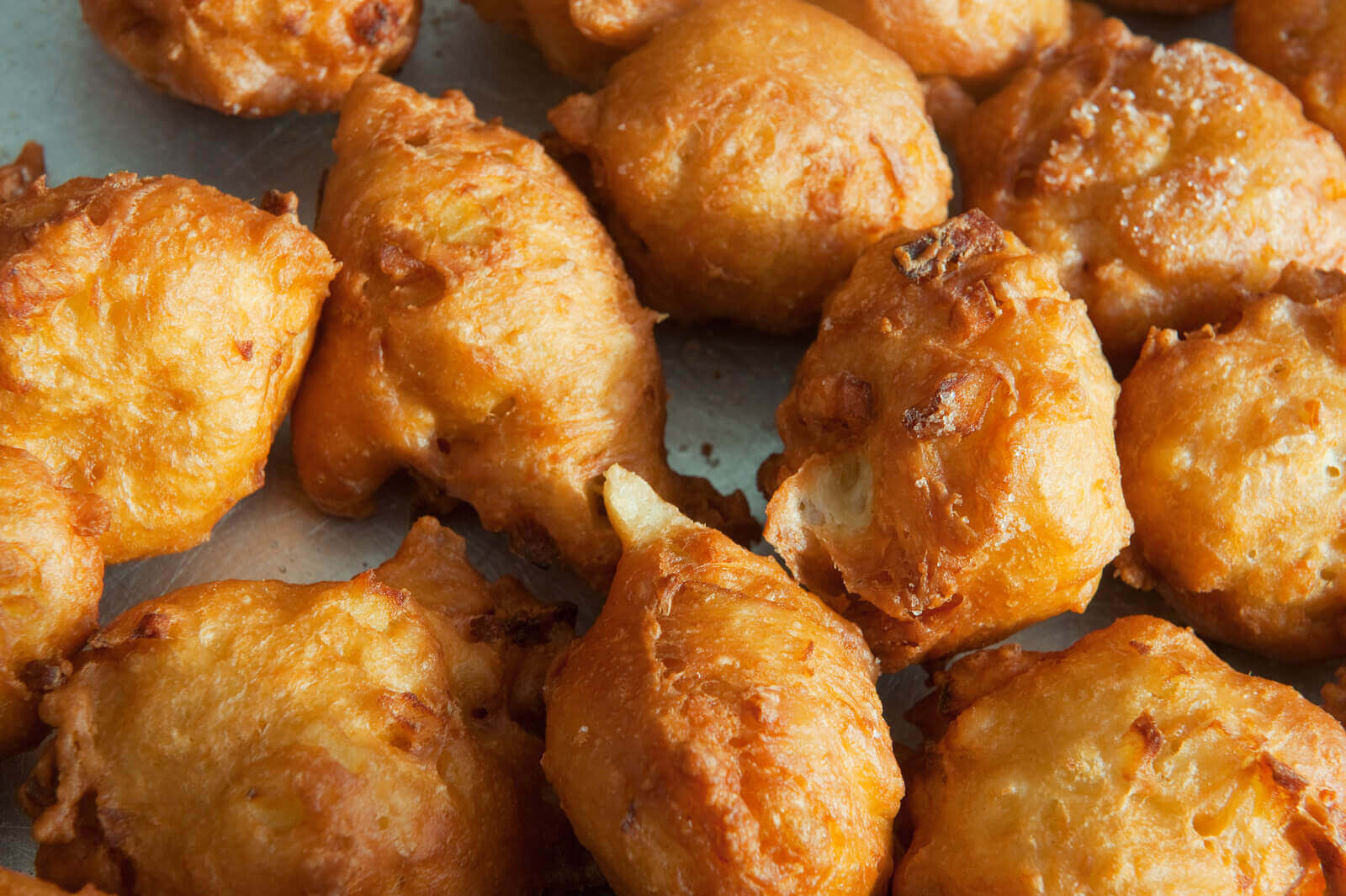
Dutch sweet treats... now we're talking!!! I know the Swedish have fika and my home nation has aftenoon tea, but truly I think the Dutch could give any country a run for their money in terms of the variety and delicious-ness (yes, I made that word up) of their sweet treats, cakes, tarts and desserts.
It's true that these are all more cake or cookie based than elaborate, elegant after dinner dessert, but that's fine with me, and after you devour this list of yummy Dutch sweet dishes I think you'll agree with me.
Dutch Appeltaart (Dutch Apple Pie)
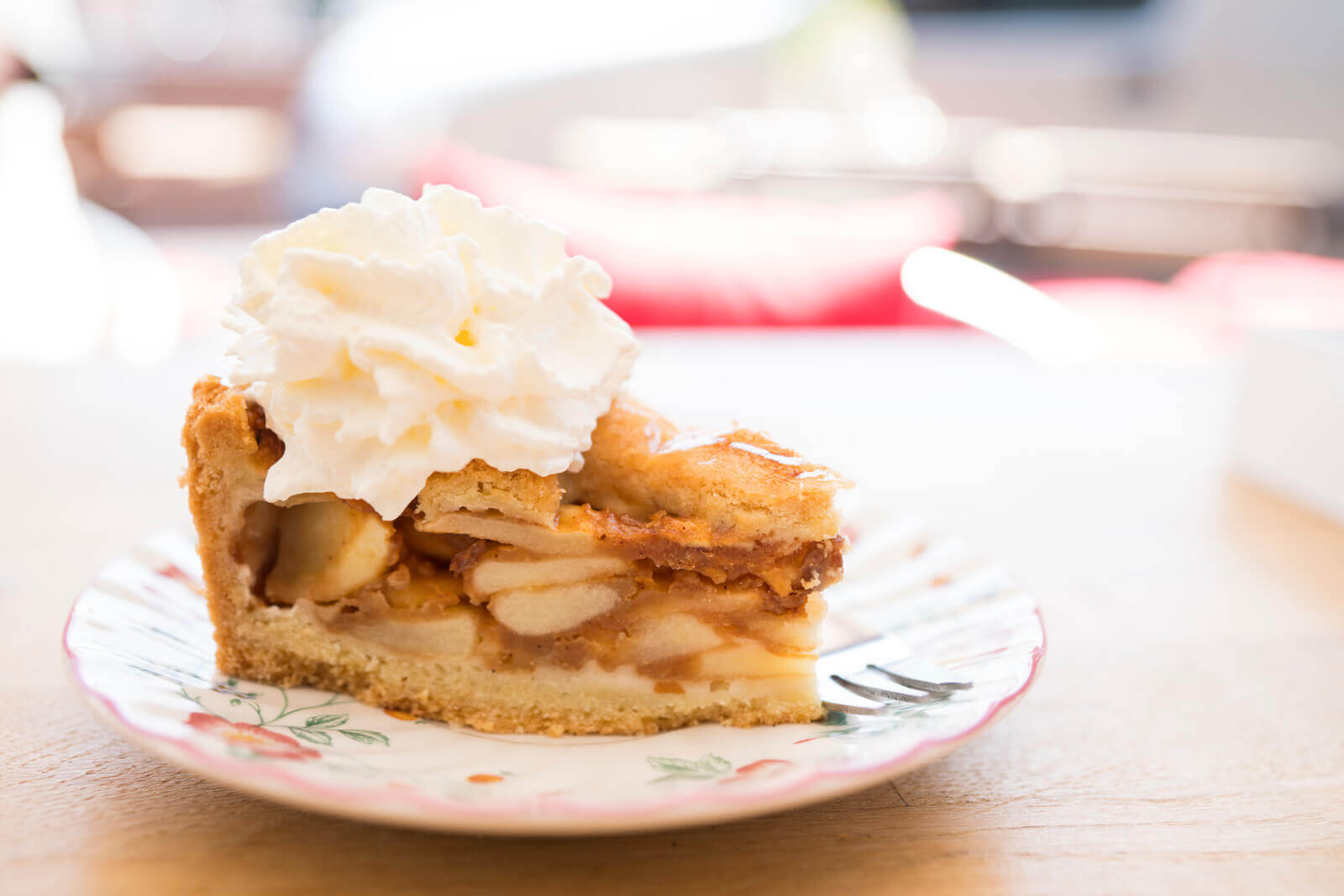
I said above that there is no order to the way these Dutch foods are listed, but I think that was a lie because there is a very good reason appeltaart - or Dutch apple pie is at the top of this shortlist of best sweet Dutch foods cakes and desserts, because it is my absolute favourite. (And psst, here is where you can find the best Dutch apple pie in Amsterdam.)
Traditional Dutch apple pie is just the best and it’s very different from an American apple pie! Traditionally served for tea/coffee time, ideally with whipped cream (yes, the squirty out of a can kind) Dutch Apple Tart has a cookie-type crust and is baked in a spring form pan rather than a pie pan. It's also probably the one dish on this whole list that I am really annoyed at myself for not making yet, so good job I have this recipe for Dutch Appeltaart to try, or this one which is vegan but I have it on good authority it's absolutely as good as the classic apple pie by a Dutch Oma (grandma!).
Poffertjes (Mini Dutch Pancakes)
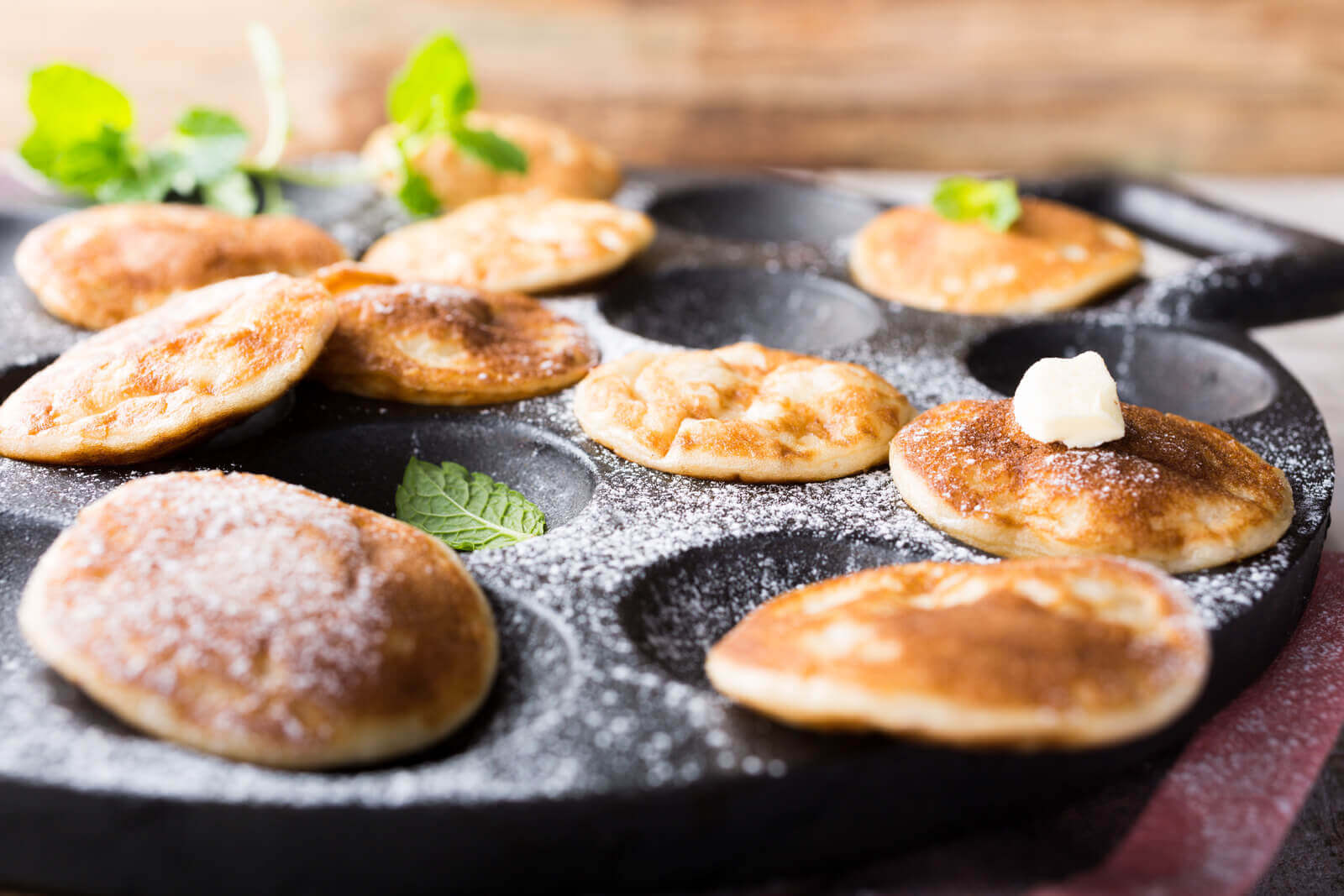
If I told you that my partner bought me a special poffertjes frying pan for my birthday this year, you will know all you need to know about me and poffertjes - they are THE BEST!
Available mostly as a street food in markets or at events, or made at home for breakfast or as an afternoon treat, poffertjes are usually served with icing sugar but you will find them being sold with any number of chocolate or other sweet sauces. While, yes, you can also make poffertjes at home too, it's worth investing in one of these special poffertje pans or you won't be able to make the perfect little round shapes so easy.
Here's the recipe for poffertjes that I'll try next (as my last attempt was a bit of a disaster) and here's a vegan version too, tried and tested by Dutchies so should be very authentic.
Speculoos/Speculaas (Dutch Speculas Windmill Cookies)
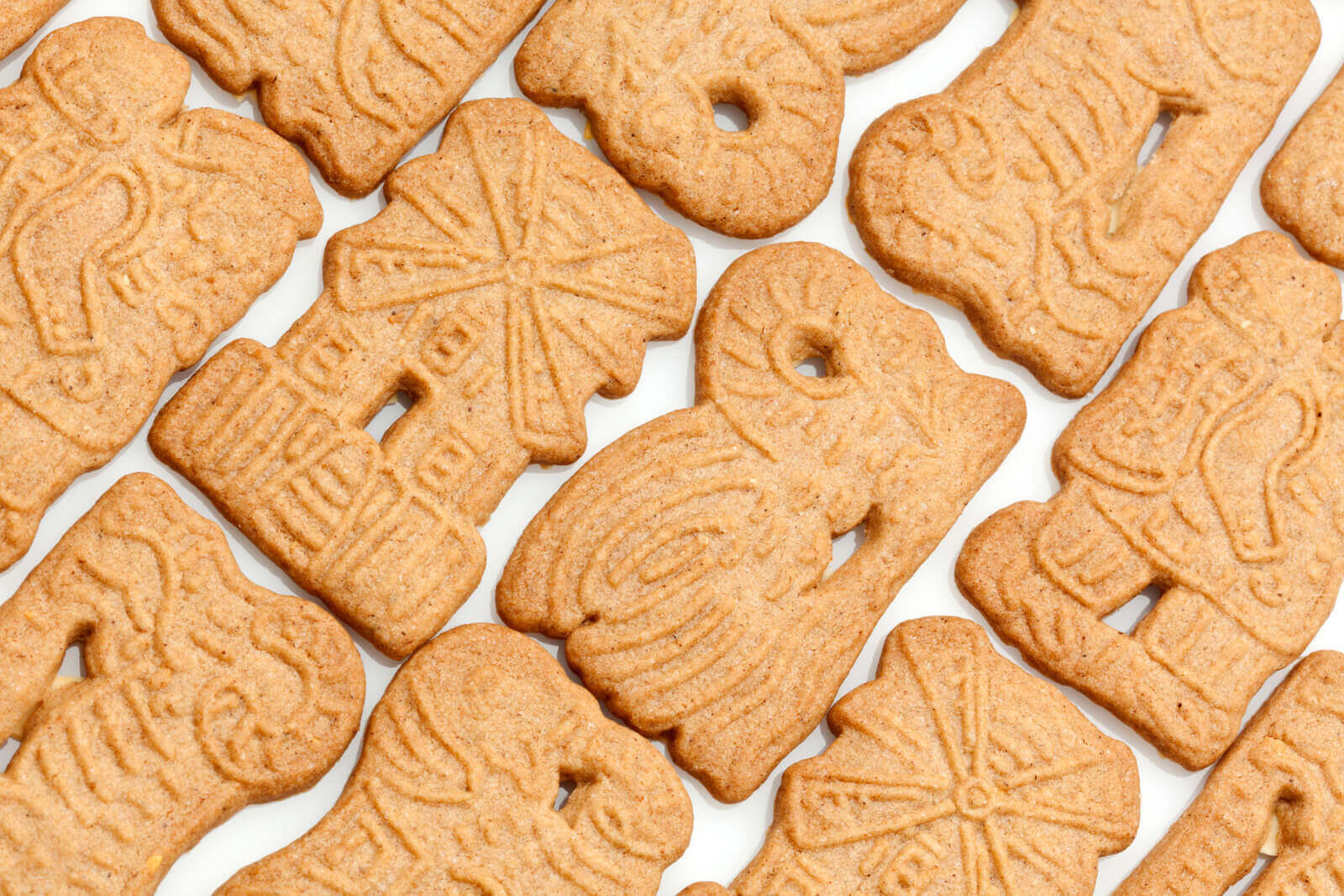
Speculoos, or speculaas, comes in nearly as many forms as it does spellings! What is essentially a special mix of spices, the most traditional way it's served is as these Dutch Windmill Cookies, and they are often served with coffees and restaurant bills all over the world, but in reality are a Dutch seasonal specialty (for winter and Christmas) although again are eaten all year round.
Traditionally made for the Feast of St. Nicholas, they are a shortbread type cookie, with a lot of spices, like cinnamon, added, which makes them fragrant and tasty! Here's a great recipe for speculaas cookies that explains all the spices you need, and here's a very similar vegan version.
Gevulde Speculaas (Filled Speculaas Cake)
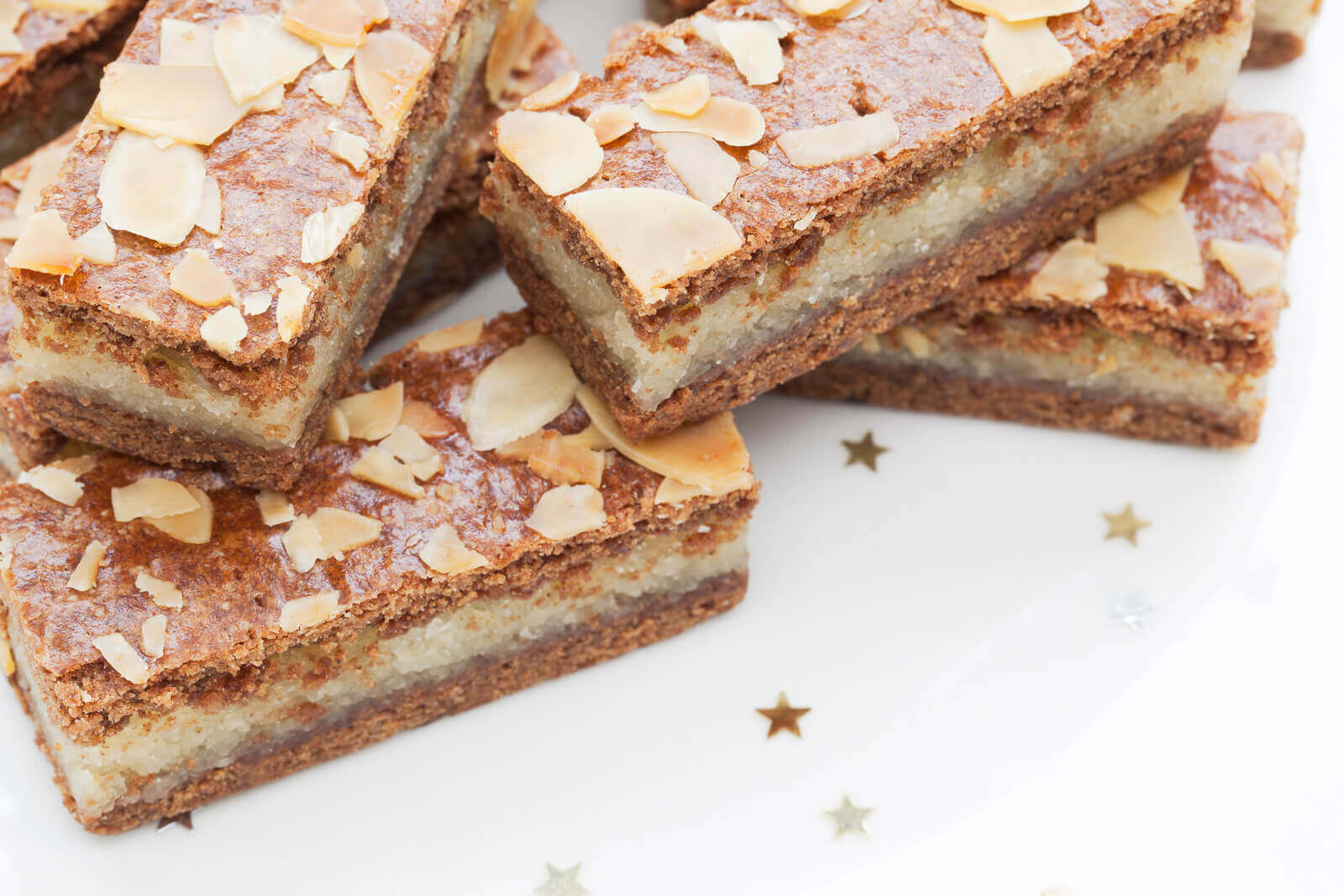
So let's stick with the speculaas themed desserts and cakes, shall we? This filled Speculaas Cake (gevulde speculaas) is a must-try and must-eat if you do indeed love the spices of speculaas. It's basically a denser version of the cookies, filled with luscious almond paste.
Here's a gevulde speculaas cake recipe to try at home, and one if you're vegan or vegetarian.
Speculaas Chocolate Cake
Possibly not a traditional Dutch food, I couldn't not include this on my list of Dutch cakes because this spicy dark chocolate cake is redolent with the famous sweet and fragrant Dutch speculaas spices. It’s glazed with a shiny dark chocolate ganache and the whole thing is egg and dairy free, making it inclusive and entirely suitable for vegans. What’s more, it’s incredibly easy to make and you can see with the recipe for this speculaas chocolate cake here, and it's vegan too!
Oliebollen (Fried Fruit Doughballs)
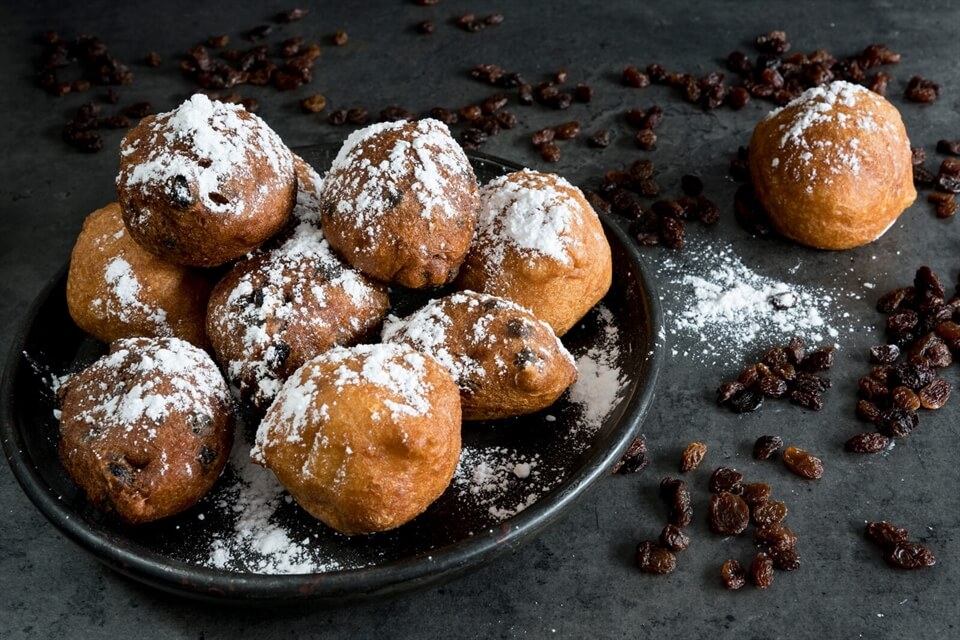
If you're Dutch, or living in the Netherlands, it's fair to say that New Year's Eve is not complete until you have had at least one oliebollen, fruit-stuffed doughnut balls. You're typically supposed to eat oliebollen, which slightly worryingly literally translates as "oil bulbs/balls", as you welcome in the New Year and you'll find temporary stalls all over Dutch cities selling them in the run up to Christmas and the New Year.
This blogger whose family are Dutch-Carribean has a great recipe for oliebollen, and it looks much easier than I expected!
Boterkoek (Butter Cake)
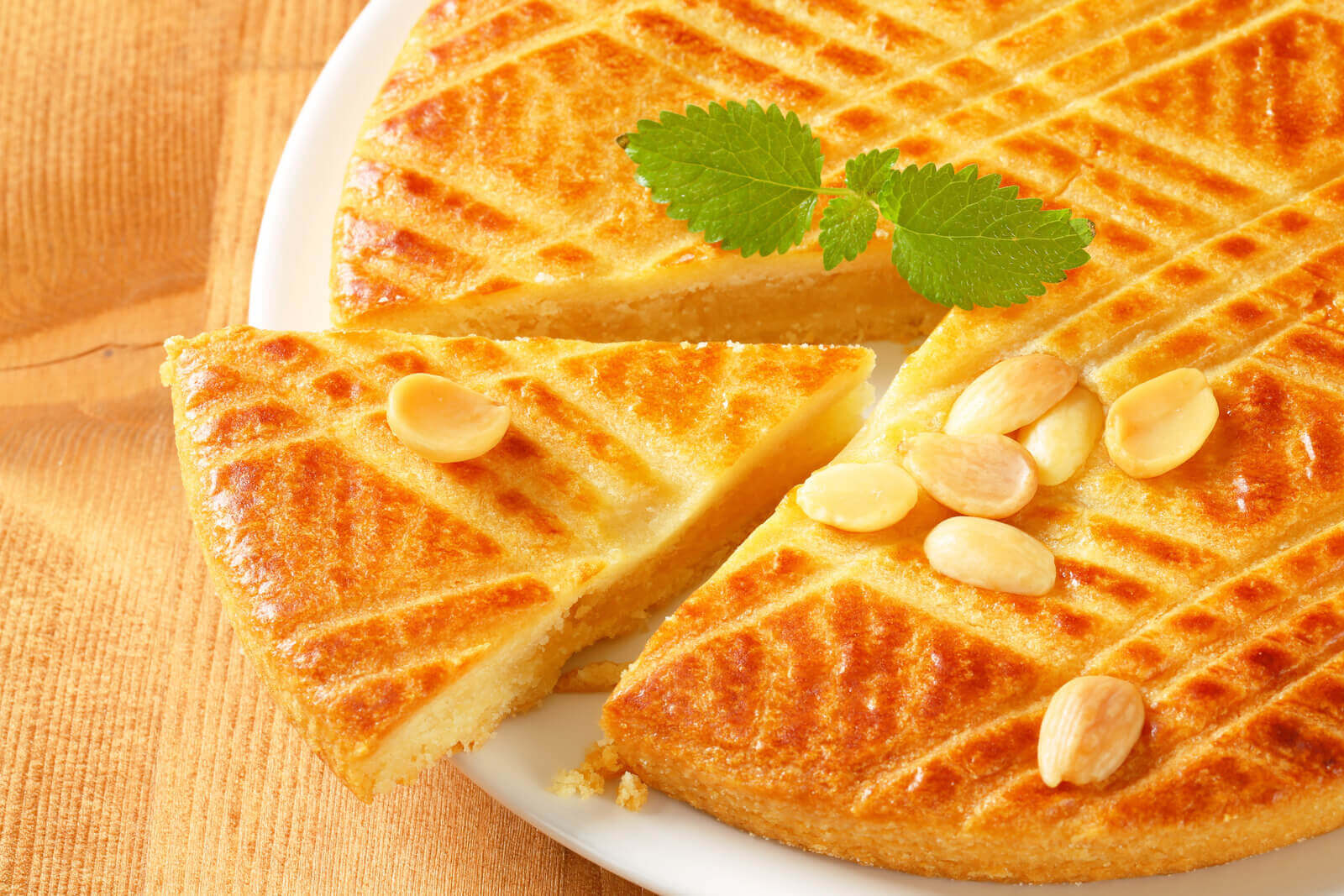
If you love butter and almonds, you will love boterkoek, a classic Dutch treat that is easy to make and delicious to eat. You'll be able to find it in most bakeries and supermarkets in the Netherlands but I have to say this boterkoek recipe makes it look very easy to knock up at home.
While the main ingredient is unsurprisingly butter, that should be easy to substitute, and this is a post with two vegan recipes to try but you'll need to use Google Translate to get it in English.
Stroopwafel (Caramel Waffles)
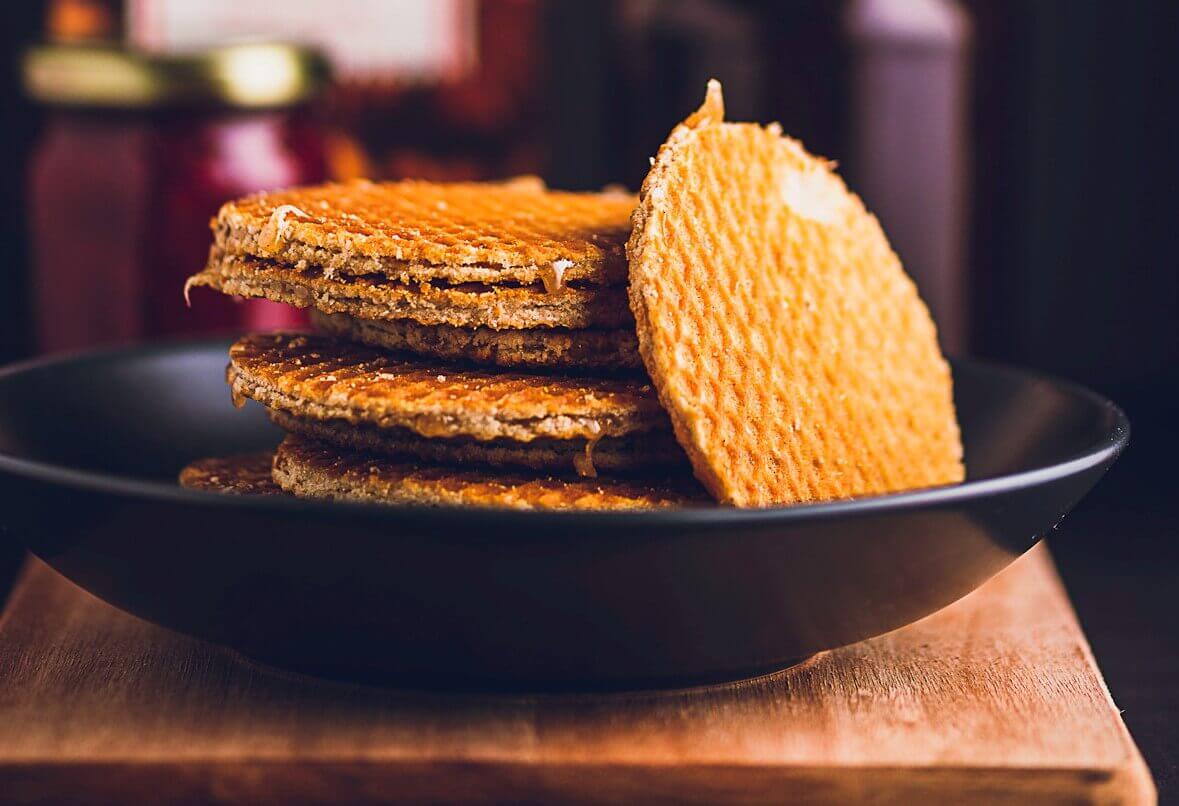
Easily one of the most popular Dutch foods, stroopwafels (literally syrup waffles) have made their way into world-famous coffee chains, but really the best way to enjoy one is at home with a hot cup of tea or coffee - indeed, traditionally you are supposed to warm you stroopwaffel up by balancing it on top of your drink as it cools down.
This then makes all the caramel inside go all goey and delicious. It's a sweet treat I'm totally intimidated to try at home, but this stroopwafel recipe makes it look a little easier than I first imagined, but you will need a waffle maker to make the process A LOT easier! The good news is you can use the same waffle maker for making ice cream cones too, so win win!
Pepernoten (Spiced Dutch Biscuits)

Another spicey seasonal treat, pepernoten are small cookies or biscuits that you eat by the handful (yes, really!) at Christmas-time. You're correct if you think noten means nuts, but there are no nuts in these sweet treats, unless you're buying an unusual specialty. I think the name just refers to their nut-like shape and size.
You'll find the shops in the Netherlands full of them in many different varieties from November (or earlier!) onwards, and they are a big feature for many families on Pakjesavond which is when Sinterklaas comes to deliver gifts to children (read more about this and other Dutch and Amsterdam Christmas traditions here), but it is very possible to make them at home. Pepernoten are also sometimes called kruidnoten (spice nuts), which hints at what makes these treats so special - THE SPICE - which you'll see in this pepernoten recipe, which I think could also be easily adapted to be vegan with a plant-based milk and butter sub.
Rijste Vlaai (Dutch Rice Tart)
With Dutch-Carribean ancestors, this chef is very well qualified to introduce you to rijstevlaai, an original rice custard tart from the city of Limburg, a place where the Netherlands, Belgium and Germany meet. Like most Dutch tarts, the crust is yeasted, so this dessert is heavier and more filling than most tarts. It's almost like a bread pudding. Here's Chef Mireille's recipe for rijstevlaai! (And here's a gluten-free version, or a vegan version, both written in Dutch so you'll need Google Translate to do some work for you.)
Koninginnevlaai ("Queen's Tart" - Dutch Apricot Tart)
This one is new to me (not yet tried it) but Koninginnevlaai is definitely one of the most traditional Dutch desserts, so yes, of course it's ORANGE! The Dutch royal family comes from the House of Orange Nassau so orange colored desserts like this dried apricot tart is usually made on Queens/Kings Day, which is normally the monarch's birthday and a national holiday. You can learn how to make Queens Vlaai here and you can find out more about King's Day in Amsterdam here.
Tompouce (Traditional Dutch Cream Pastry)
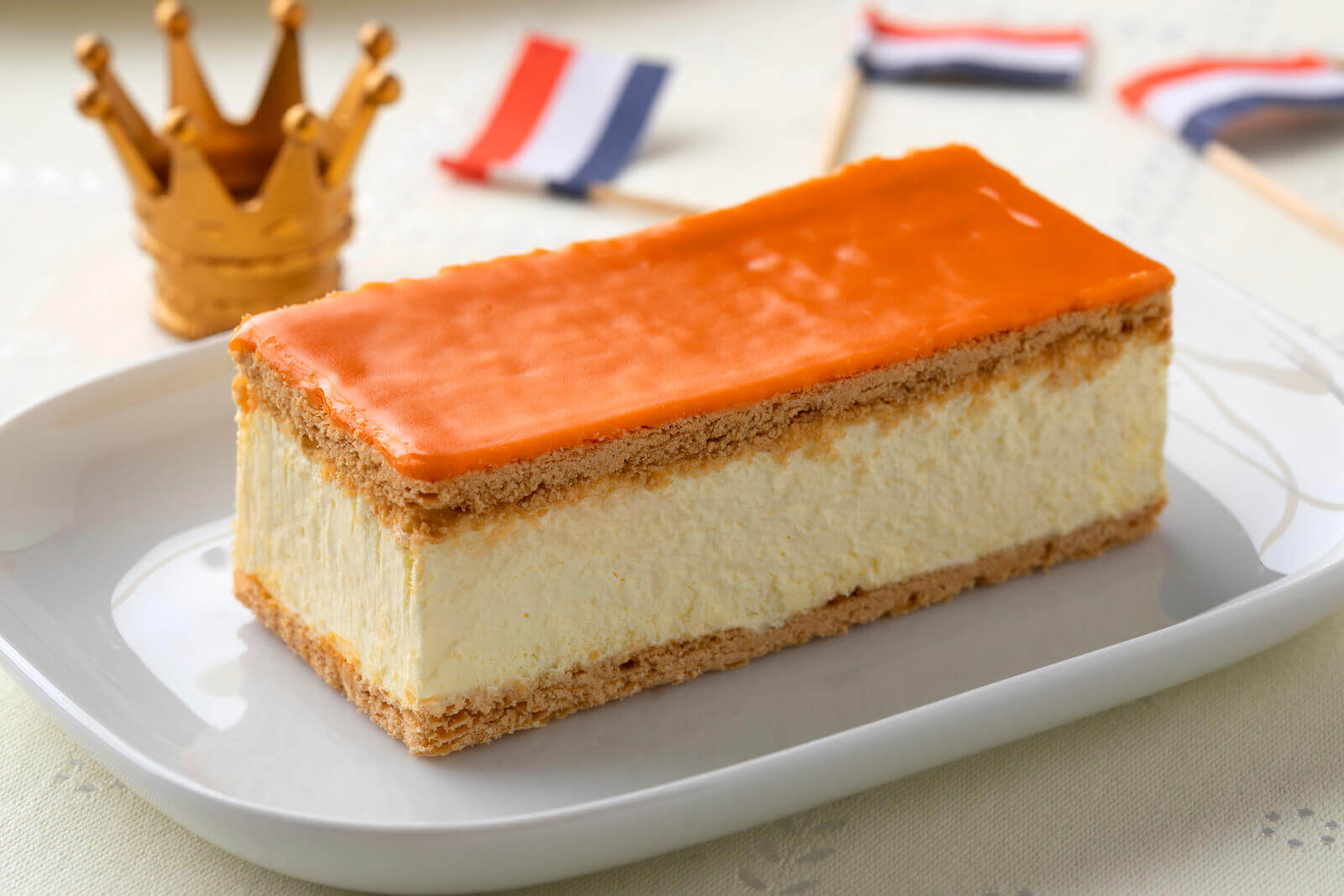
Another popular Kings or Queens Day sweet treat is tompouce! This is a sticky, creamy, and so messy but fun sweet treat and it is a Dutch tradition to eat orange tompouce on King’s Day – the King’s birthday, on April 27th. At other times of the year, the Dutch eat this pastry with pink glaze on top instead of orange so don't think you're limited on when you can try it. Here's how you make tompouce at home, and good news, the recipe is vegan/vegetarian friendly!
Ontbijtkoek (Dutch Spiced/Honey Breakfast Cake)
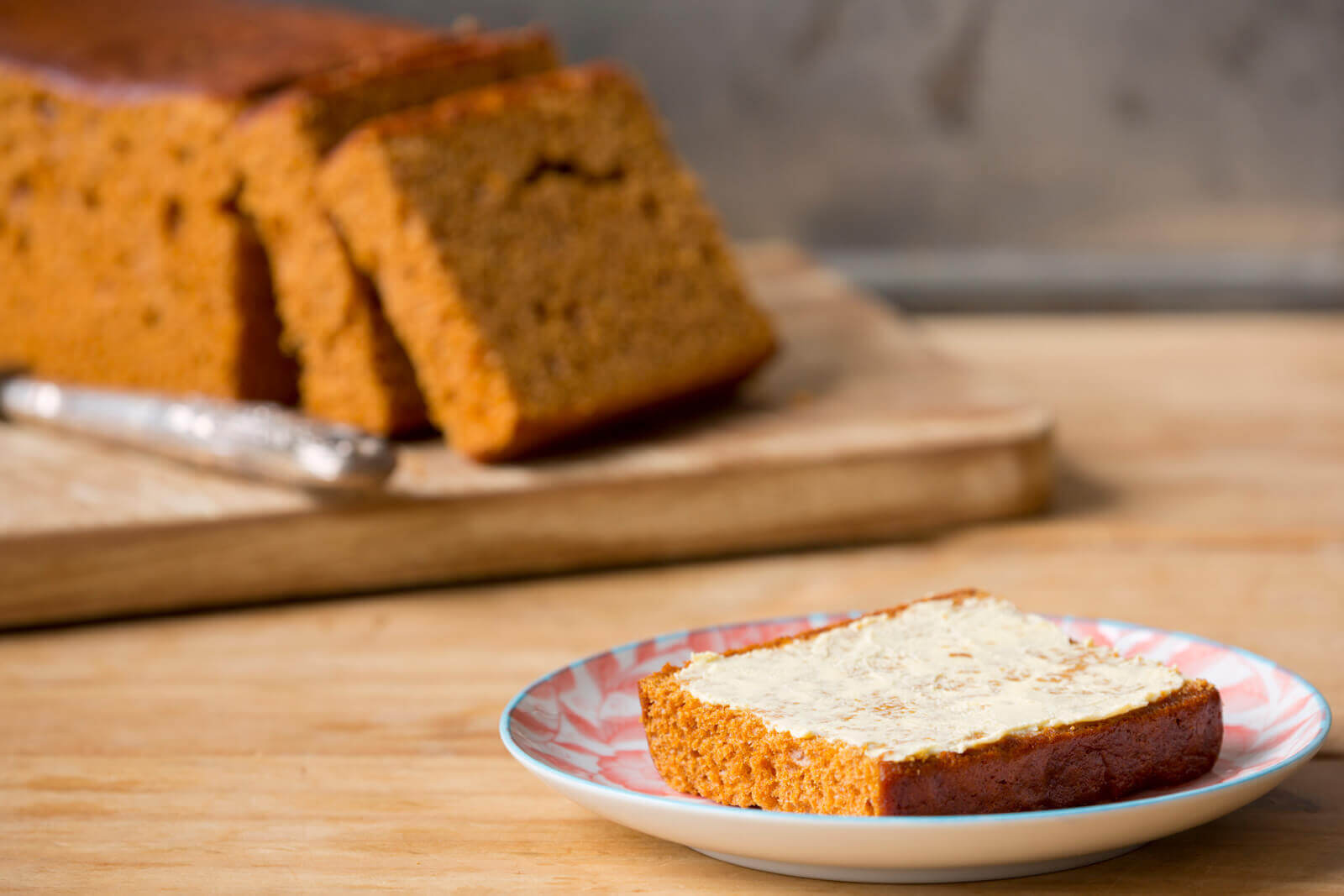
I think this should possibly be a bit further up the list as I'm quite partial to a bit of ontbijtkoek. However, I rarely eat it for breakfast, but nobody's kicked me out of the country yet.
This recipe for ontbijtkoek, or Dutch spiced honey breakfast cake, also showed me that it's quite easy to make at home so I think I need to get around to that soon! And this is a recipe for a gluten-free, sugar-free and vegan version - again it's in Dutch but Google Translate does pretty well.
Jan Hagel Koekjes (Jan Hegel Shortbread Cookies)
I'm going to hand over to Chef Mireille again to introduce these cookies to you because while I've occasionally seen them in bakeries all over Amsterdam, I don't know much about them. "Jan Hagel are traditional Dutch cookies decorated with almonds and pearl or rock sugar. These shortbread cookies date back to the 17th century and are especially popular during the festive season." Here's a recipe to make Jan Hegel cookies at home.
Groningen Poffert Cake
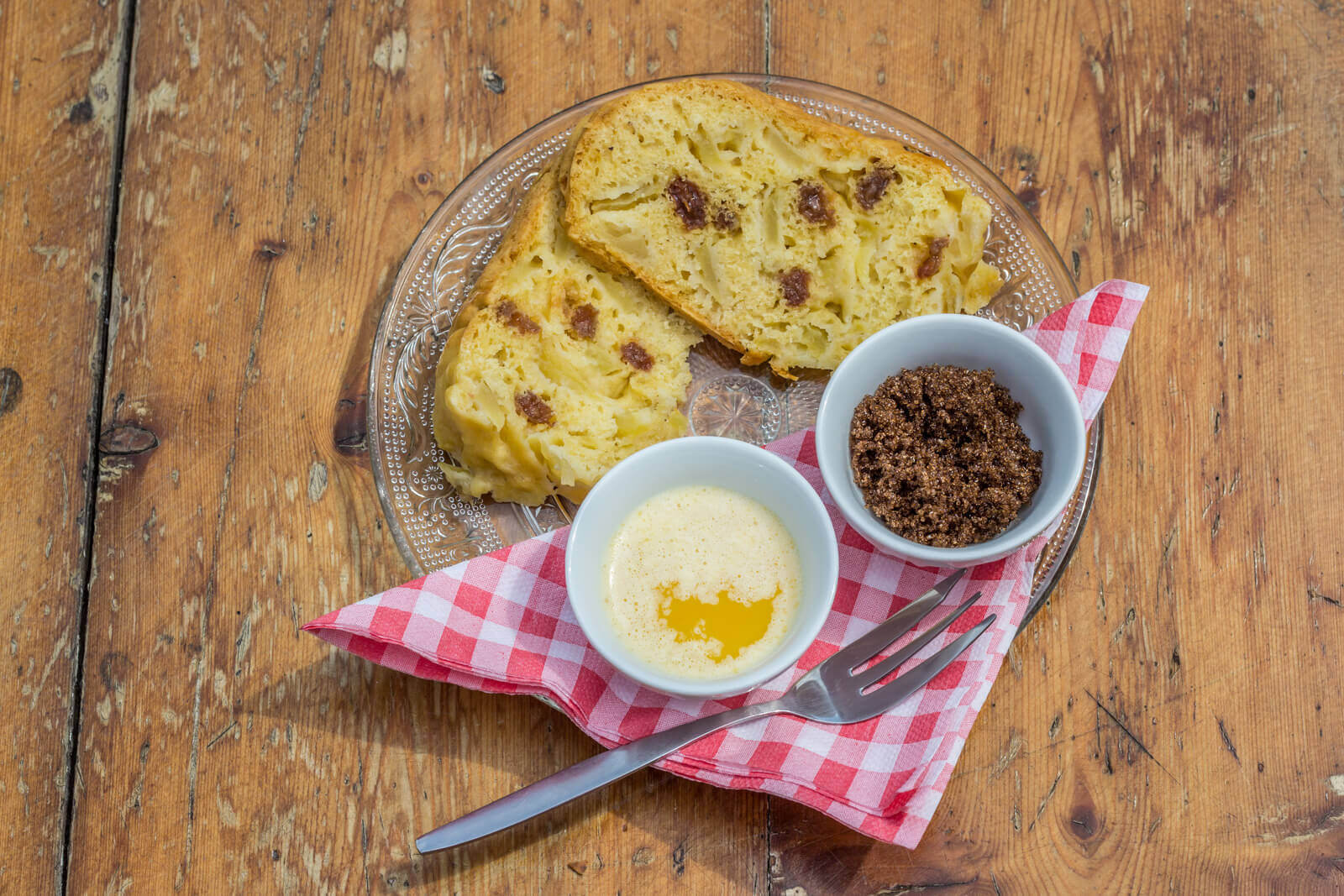
This is a Dutch cake I've not actually heard of myself, but I'm pretty keen to try it, maybe even make it myself using this poffert recipe. I'll let the recipe's creator introduce you to the cake: "Poffert is a typical Dutch mid-afternoon snack hailing from the Dutch province of Groningen. Very little sugar is used as apples and raisins are used instead to add sweet treat."
Please do let me know if there's a traditional Dutch dish I've missed and if you'd like to save or share this post on Pinterest, here are some images you can pin:
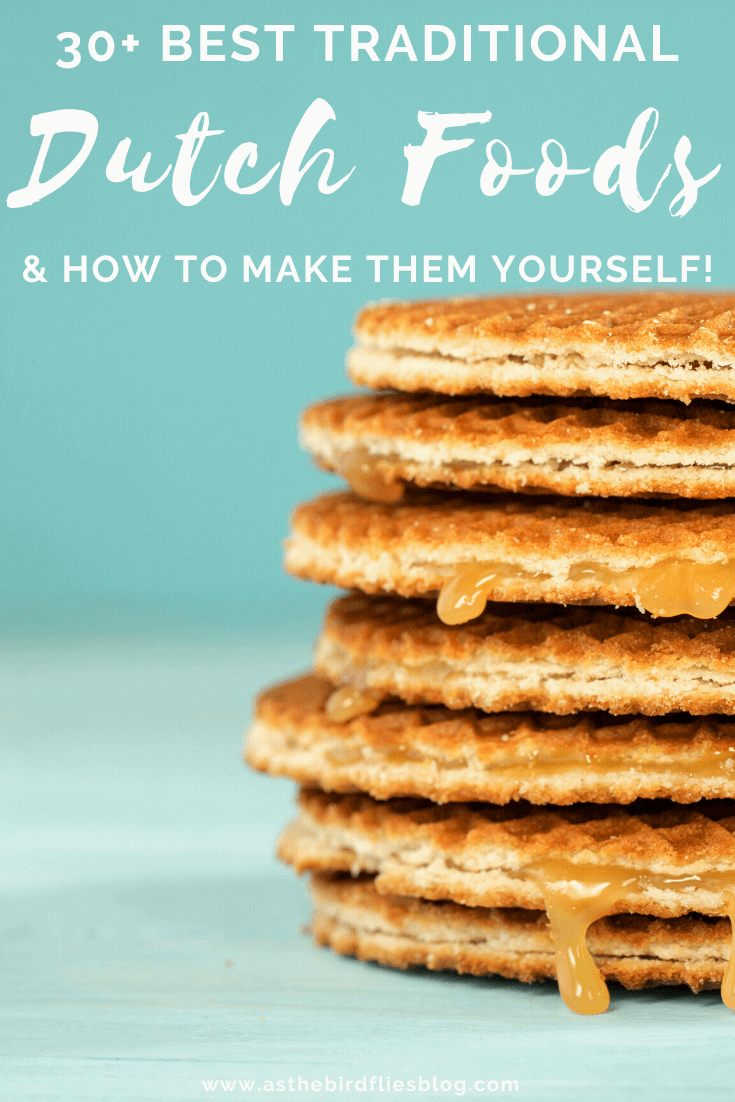
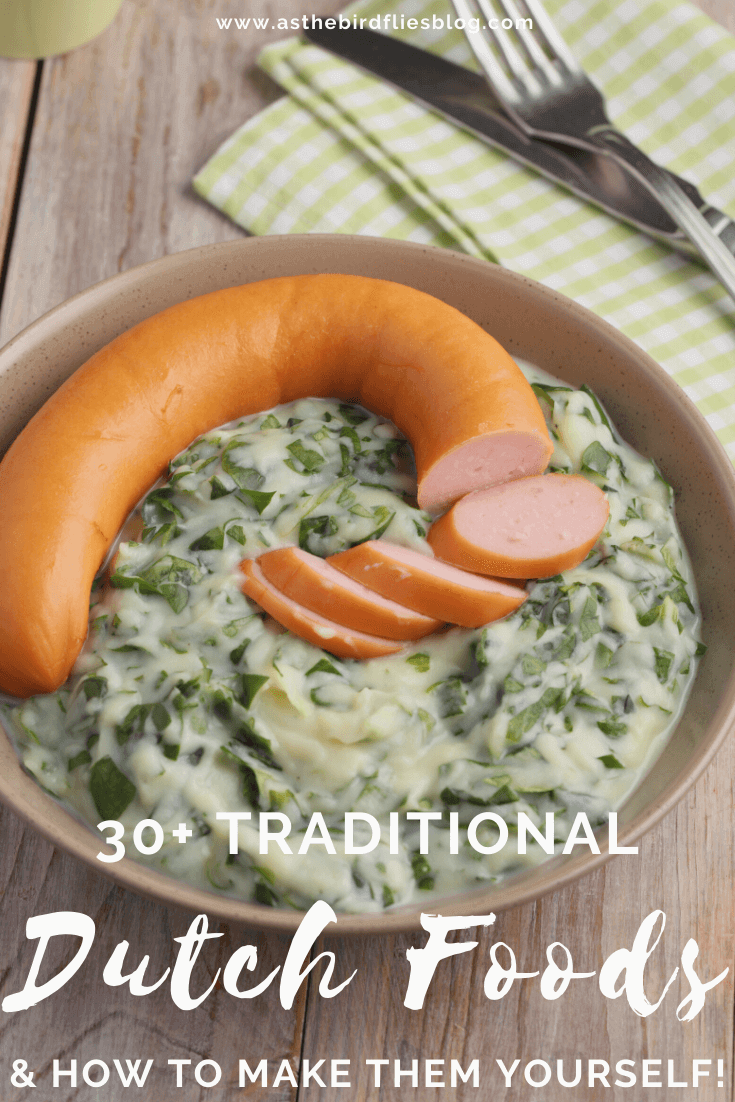
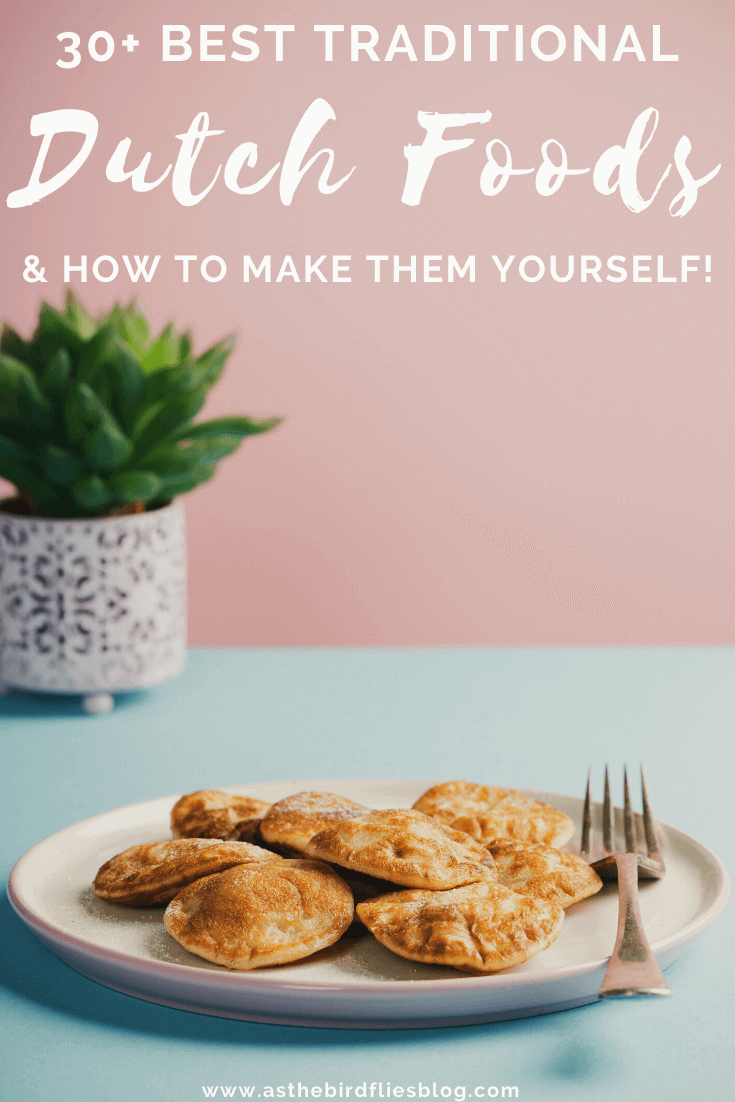

Frances M. Thompson
Find Frankie on Facebook, Twitter, Instagram, Pinterest, and Google+.
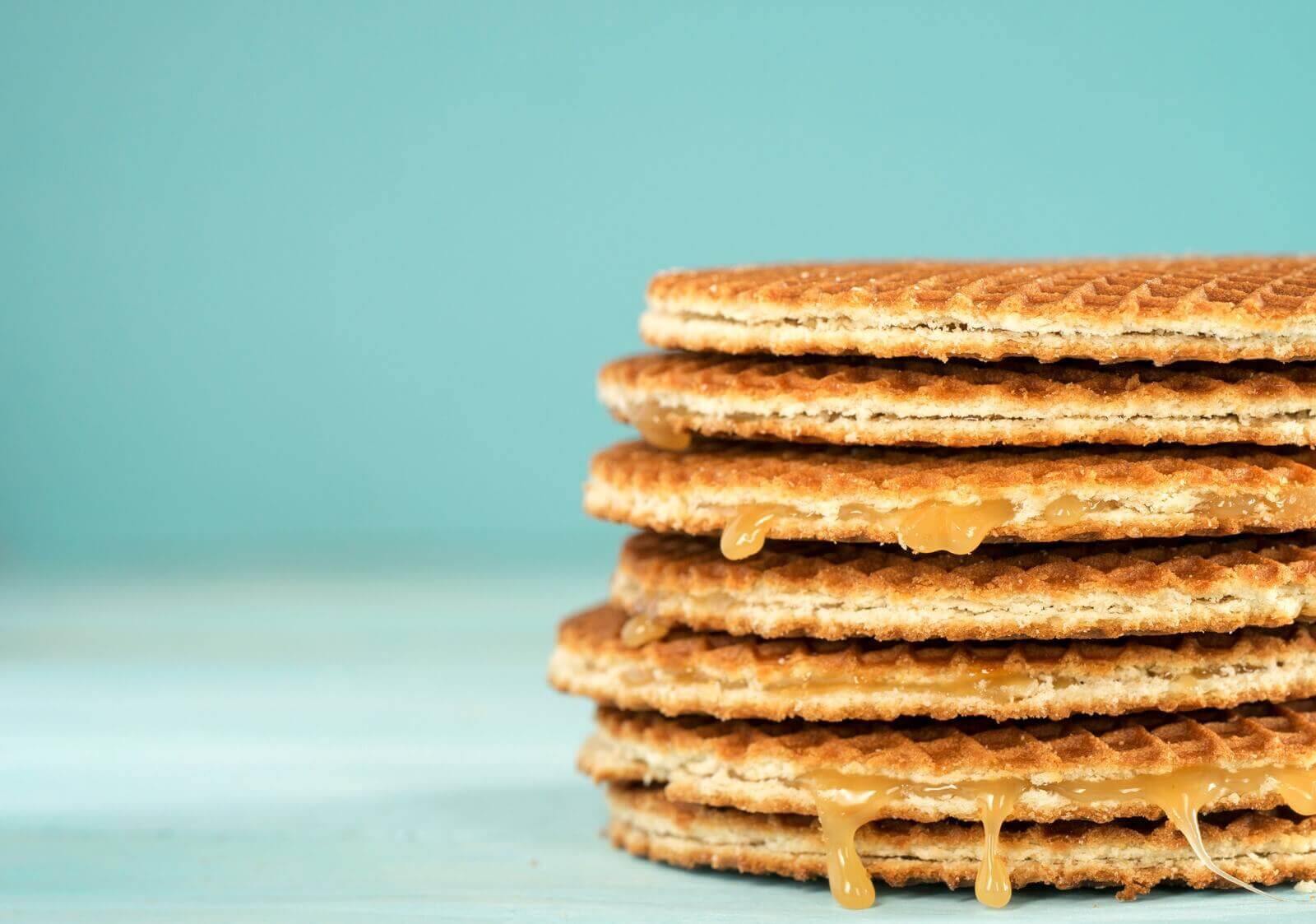
 Family Travel: How to Travel with Kids - My Golden Rules
Family Travel: How to Travel with Kids - My Golden Rules_x300.jpg?v=1) Amsterdam Travel: Best Luxury Hotels in Amsterdam - Reviewed!
Amsterdam Travel: Best Luxury Hotels in Amsterdam - Reviewed! Solo Luxury Travel: Best Caribbean Islands for Solo Travellers
Solo Luxury Travel: Best Caribbean Islands for Solo Travellers Amsterdam Staycation: The Best Tips, Ideas & Hotels for a Staycation in Amsterdam
Amsterdam Staycation: The Best Tips, Ideas & Hotels for a Staycation in Amsterdam New Zealand Travel: 51 Interesting Facts About New Zealand Aotearoa
New Zealand Travel: 51 Interesting Facts About New Zealand Aotearoa About the Blog & Frankie
About the Blog & Frankie Welcome to My Amsterdam Travel Blog!
Welcome to My Amsterdam Travel Blog! Welcome to My Luxury Family Travel Blog!
Welcome to My Luxury Family Travel Blog! Welcome to My Writing Blog!
Welcome to My Writing Blog! Lover Mother Other: Poems - Out Now!
Lover Mother Other: Poems - Out Now! I Write Stories That Move You
I Write Stories That Move You Order WriteNOW Cards - Affirmation Cards for Writers
Order WriteNOW Cards - Affirmation Cards for Writers Work With Me
Work With Me